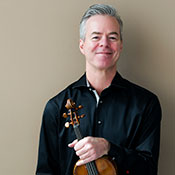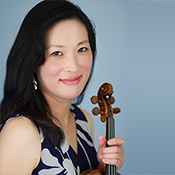
Ilana Setapen talks legacy, inspiration & playing Barber
David Lewellen
PUBLISHED
Tagged Under: 2016.17 Season, Classics, MSO Musicians, Violin
When Ilana Setapen solos this week with the Milwaukee Symphony, she’ll carry the legacy of her teachers with her.
Setapen, who was appointed the MSO’s associate concertmaster in 2009, will perform Samuel Barber’s Violin Concerto, one of the staples of the solo repertoire. And when she plays the second movement, she’ll be thinking of her undergraduate professor, Robert Lipsett. “He got more emotional about that movement than anything else I ever studied,” she said. “He said it gets to him every time. So I’ll definitely be channeling him as I play.”
Like many young musicians, Setapen chose her college based on the teacher she wanted — in her case, Lipsett, who at the time was teaching violin at the University of Southern California. As a teenager, “I didn’t know who I was as a musician,” she said, but Lipsett “molded me into someone who was really comfortable with what I had to say.”
That process began with a lot of basic technical work. She had entered college thinking of herself as an expressive musician. But growing up as the best young violinist in Amarillo, Texas (where her father conducted the Amarillo Symphony), she wasn’t prepared for the intense competition at the next level, and her teacher did not sugarcoat that.
Sometimes, Setapen recalls, she chafed at working on etudes and exercises, but she realizes now that it was necessary. “My pitch was an A-minus,” she said, “and you can’t be an orchestra musician with A-minus pitch.”
Her first violin teacher was her mother, Carol Setapen, with whom she studied until she was 11, when “the lines became too blurred.” But her mother, as well as Lipsett, still influence her teaching style. In Ilana Setapen’s busy private studio, “I do strive to emulate their impact,” she said. “The way they challenged me to work harder, listen more, and the confidence they instilled in me to know that there’s always room to be a little bit better.”
Setapen studied with Lipsett for six years, both at USC and The Colburn School in Los Angeles. But when she had saved a little money, she decided it was time to go to New York and pursue her master’s degree at Juilliard. “I tend to trust a lot in authority figures,” she said, but at that point she was old enough to draw her own conclusions from studying with two teachers — Donald Weilerstein and Joseph Copes. “The goal is always to sound beautiful,” she said, but their different perspectives made her realize that she could do so in different ways.
Although Setapen learned the Barber concerto as a student, this week will be her first performance of the piece since then. She began preparing “sooner than I would have if I didn’t have a baby,” she joked. She and her husband, Matthew Brink, welcomed their son, Asher, in November, and she spent some of her maternity leave getting the concerto under her fingers.
The first two movements, she said, are lush and singing, but the third is “a complete tour de force. It’s total show-offy material. They all work together, but they wouldn’t work apart.”
Setapen won the MSO job before she finished her Juilliard degree, and immediately plunged into learning new repertoire while sitting in the first row of string players. (In fact, she remembers, in her very first week with the orchestra, concertmaster Frank Almond was away and she had to lead the section in three programs in three different venues.)
As associate concertmaster, her job is to back up Almond. “It’s a very different job when I have to move one seat over,” she said. “My body language is more pronounced, and instead of following, I lead.”
Almond said that in addition to being a great musician, Setapen has the leadership qualities necessary for her role, “and you don’t learn that at Juilliard or Colburn. You have to learn it on the job.”
Setapen’s job, Almond said, in some ways is harder than his own, because she needs to do all of the same preparation without knowing if she might actually be called on to step in for him. “We’ve relied on each other a lot for various personal things,” he said. “And in performance, if she miscounts something, I come in, and if I miscount something, she acts like the concertmaster.” The MSO, he said, is “lucky to have someone on her level in that chair. It doesn’t always happen.”
Setapen began her professional career with ambitions to be a full-time concertmaster somewhere. But eight years later, she knows that “those jobs don’t come open very often. Particularly in a city as pleasant as Milwaukee, with a symphony that sounds as good as Milwaukee.”



